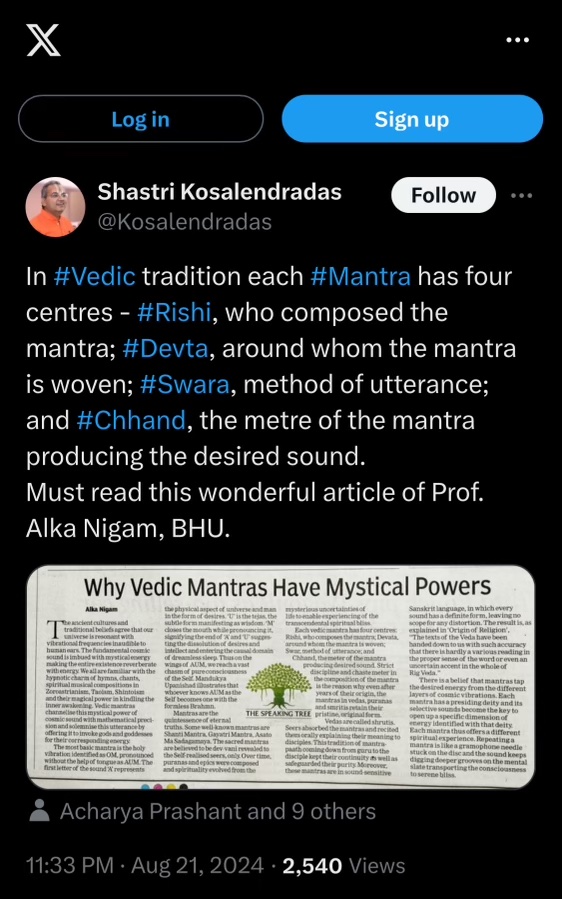Alka Nigam
July 16 2014: The Times of India (Delhi)
Literature is also philosophy. Though some critics differ, there are innumerable literary examples of visionary poets revealing primeval truths. These poetic revelations are universal spiritual truths to which no one person, age or religion can lay exclusive claim. Of a radically different milieu and conviction, in their attempt to unravel the mystery of life and death, poets secure the same rapport with the central spiritual reality, as could sages.
Tennyson acknowledges that intellect is not potent enough to realise ultimate reality, it only “stirs the surface-shadow“ but never “hath dipt into…/ The abysm of all abysms“. Vedic scriptures declare the illusory dualistic veil or surface-shadow as `maya’. This is something we need to overcome.
Mystics perceive reality through Self-realisation and poets and thinkers perceive it through transcendental imagination. Once they experience out-of-body consciousness, poets reach the realm of pure consciousness and the self seems “to dissolve and fade away into boundless being; and this is not a confused state, but the clearest of the clearest…the loss of personality (if so it were) seeming not extinction but the only true life.“ Tennyson here conveys the essence of advaita vedanta, the cardinal tenet of which is the same. Brahmn alone is real. The universe is unreal, and the individual soul is none other than the universal soul.
In Memoirs Tennyson informs Mrs Bradley: “There are moments when this flesh is nothing to me, when i feel and know the flesh to be the vision, God and the spiritual the only real and true.“ On the death of Keats, Shelley knew: “He hath awakened from the dream of life.“ Wordsworth feels the same state when the “breath of this corporeal frame“ is “almost suspended“ and then “we are laid asleep in body, and become a living soul“. D H Lawrence is overjoyed at the prospect of discarding his flesh “Like luggage of some departed traveller“.
A parallel is found in the autobiography of Sri Yogananda: “The flesh was as though dead, yet in my intense awareness i knew that never before had i been fully alive. My sense of identity was no longer narrowly confined to a body but embraced the circumambient atoms…An oceanic joy broke upon calm endless shores of my soul. The spirit of God, I realised, is exhaustless Bliss.“
Evidently this state is not confined to sages. Plato regarded this divine madness to be a divine blessing granted to man. Saint Paul and Francis of Assisi are reported to have fallen into the same ecstatic trance. The poet William Blake confidently said: “I am in God’s presence night and day.“ In this mystical trance, which is seeing the soul with bodily eyes closed, is when we receive the highest kind of intuitive knowledge. In the Kathopanishad, Yama tells Nachiketa that the supreme person, the size of a thumb, dwells forever in the hearts of all beings. Krishna assures us in the Gita that He is seated in the heart of all beings. Christ knew that the Kingdom of Heaven is within us. Vivekananda said: “After long searches here and there, in temples and churches…. at last you come back completing the circle from where you started, to your own soul and find that He…is nearest of the near, in your own Self.“
Poets are born, not made. Socrates says what poets compose they compose not by wisdom but because they are inspired. The purest creative moments of their inspiration have filled literature with pure magic. Entirely different from the tradition of mystics, their vision nevertheless contributes to our spiritual heritage. Post your comments at speakingtree.in

Leave a Reply